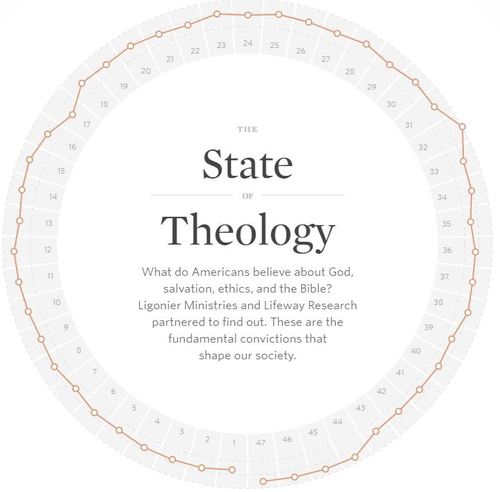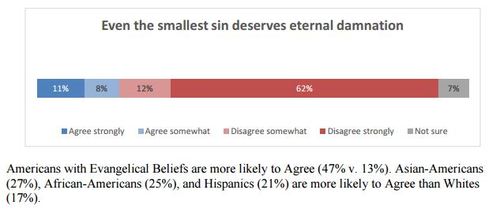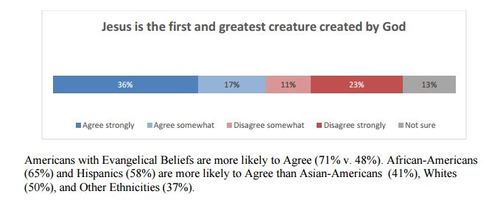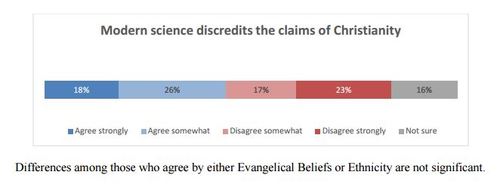“Disregard the study of God, and you sentence yourself to stumble and blunder through life blindfolded, as it were , with no sense of direction, and no understanding of what surrounds you. This way you can waste your life and lose your soul.” J.I. Packer
While authentic believers recognize that theology is the preeminent measure of our understanding of who God is and who we are, Packer’s words truly reflect the bottom line risk. Get your understanding of God wrong, and your life will be wasted and, more worrisome, your soul eternally jeopardized. This is what, friends, drives polemics. Of course, Scripture also commands us to contend for the faith, warning as it does of the increasing frequency of false teachers as time unfolds. Each believer simply must contend.
In 2016 Ligonier Ministries commissioned LifeWay Research to implement a survey tasked with, as much as surveys are capable, assessing Americans’ theological understanding. The survey quantified fundamental beliefs that have been key doctrines adhered to by two millennia of orthodox Christianity.
The results reflect what the observant believer already knows … error abounds. As false teaching gains footholds and favor, as churches forsake sound doctrine to instead scratch itching ears, the prevalence of error will continue to grow. Ligonier’s survey highlights the most serious errors contemporary to us.
The 2016 survey is a repeat of a 2014 undertaking, with the current report reflecting a continued decline of adherence to the fundamentals of the faith. Questions ranged from belief in God, sin, salvation, heaven and hell, and the church. Also included were questions about Scripture, its authority and inerrancy.
“Faithful Christians can look at these survey results and lament the state of theology in America.” (Source)
Perhaps the most noticeable decline in the two-year gap between surveys is the response to the statement:
“An individual must contribute his or her own effort for personal salvation.”
In 2014, 40% of respondents agreed with this statement. The 2016 survey found fully half (50%) in agreement. A similar survey question, “By the good deeds that I do, I partly contribute to earning my place in heaven,” found 52 percent of 2016 respondents agreeing fully or somewhat. Though not explicitly included in the query, one can only presume that walking the aisle, raising the hand, and/or repeating “the prayer” constitute some of their “own effort for personal salvation” – those efforts, of course, glaringly absent from Scripture.
When churches, expected as they are to proclaim God’s truth, instead addend Scripture with damnable man-made fiction, the result is more serious that merely erroneous answers on a survey. False beliefs are eternally jeopardizing, as the previous question reveals. The crux of the matter, then, is Scripture.
Several questions in Ligonier’s survey focused on Scripture and the beliefs of Americans, including self-defined evangelical Christians, about it. The answers to all posed questions reflect a woeful, unorthodox view of the Bible.
94% of evangelicals agreed with the statement that “God is the author of Scripture,” but some 17% of them also concurred with the statement, “The Bible, like all sacred writings, contains helpful accounts of religious myths but is not literally true.” Further disturbing among professing evangelicals are the 30% who agree that “The Bible was written for each person to interpret as he or she chooses.”
While it may seem laudable that 95% of evangelicals agreed, either strongly or somewhat, with the statement that “the Bible is 100% accurate in all that it teaches,” the evidence that the majority of them don’t know what it teaches is reflected by the following result. When presented with the statement, “Jesus is the first and greatest creature created by God,” a staggering 71% of evangelicals agreed. Obviously holding a correct understanding ABOUT the Bible is a far cry from gleaning correct understanding FROM it. (Andy Stanley is perhaps simply the most recently notable of efforts from WITHIN the church to deconstruct, disregard, and destroy dependence on Scripture.)
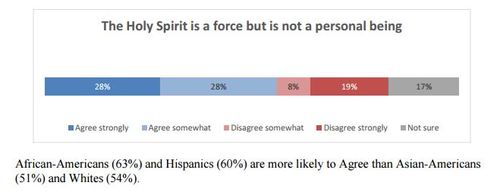 The decline of Scriptural literacy is further evidence by the 54% of evangelicals who agreed with the notion that “everyone sins a little but most people are good by nature.” Calvinists will likely not be surprised by the 82% of evangelicals who believe “people have the ability to turn to God on their own initiative.” So much for being “dead in trespasses and sins.” As to God being a “perfect being” incapable of making a mistake, 97% of evangelicals agreed with only 58% of all respondents in tow. But as to His sovereignty, 65% of evangelicals and 58% of all respondents agreed with, “God knows everything in the world but does not determine all that happens.”
The decline of Scriptural literacy is further evidence by the 54% of evangelicals who agreed with the notion that “everyone sins a little but most people are good by nature.” Calvinists will likely not be surprised by the 82% of evangelicals who believe “people have the ability to turn to God on their own initiative.” So much for being “dead in trespasses and sins.” As to God being a “perfect being” incapable of making a mistake, 97% of evangelicals agreed with only 58% of all respondents in tow. But as to His sovereignty, 65% of evangelicals and 58% of all respondents agreed with, “God knows everything in the world but does not determine all that happens.”
In general, Americans have increasingly wrong notions of Scripture and its teaching. This can hardly be a cultural surprise. After all, it’s been over five decades since prayer and Bible reading were removed from the classroom. Prayer took the Supreme Court hit in 1962 in Engle v. Vitale. Bible reading came the subsequent year in Abingdon School District v. Shempp. The Biblically informed will recognize that talking to God and reading about God are destined to be anathema in the increasingly depraved world. The problem revealed by of this survey, however, is that correct teaching of Scripture within the professed “churched” community is waning. One presumes that “if you teach it, they will know” is not a pulpit-friendly, pew-filling pursuit for many churches.
On contemporary hot-topic issues such as abortion and homosexuality, evangelicals tend to hold to a more Biblically-informed position than the general population. Over 99% of evangelicals agreed that “God created male and female” as opposed to only 72% of all respondents. But as to the “Bible’s condemnation of homosexuality,” 19% of evangelicals agreed that its stance is not applicable today, while 47% of the population as a whole concurred. As to abortion, 41% of Americans believe it to be a sin, with only 87% of evangelicals finding it to be so.
Concluding their commentary on the results of the study, Ligonier said:
Faithful Christians can look at these survey results and lament the state of theology in America. Or, we can look at these results and engage our Great Commission work with a renewed urgency and purpose. Ligonier Ministries is taking the latter approach. It is easy to get distracted by cultural trends and apply our resources toward chasing novel methodology. This survey reminds us of the necessity of teaching foundational truths: God’s holiness, Christ’s person and work, humanity’s true need to be saved from the wrath of God, and the Bible’s authority—even in the twenty-first century. (Source)
The summarized survey report from Ligionier Ministries can be found HERE.
The complete report is available here: 2016-state-of-america-white-paper
[Contributed by Bud Ahlheim]

